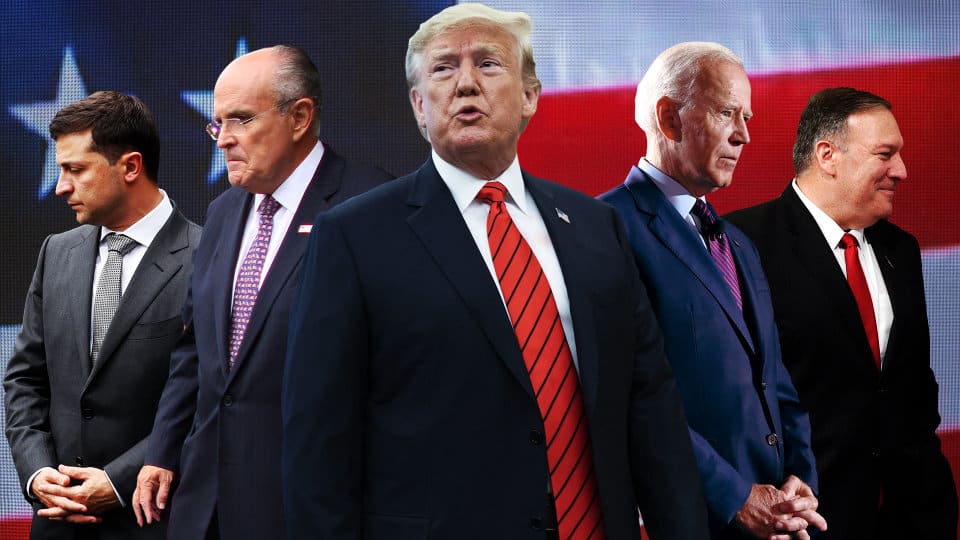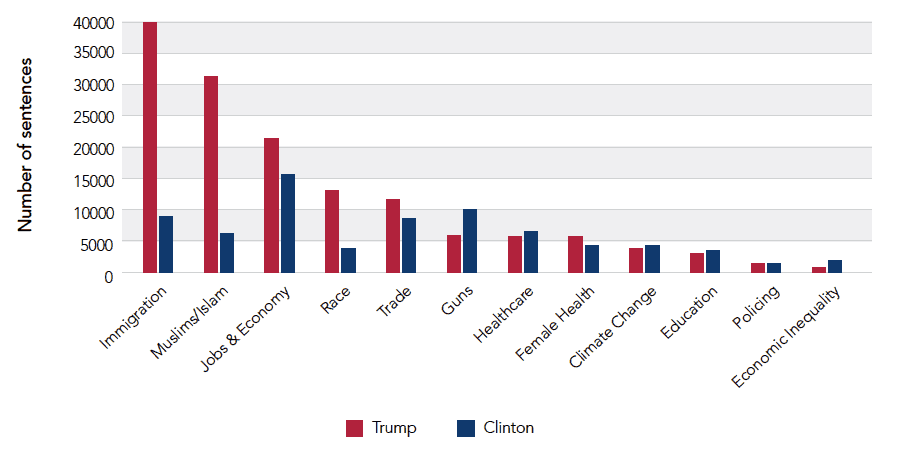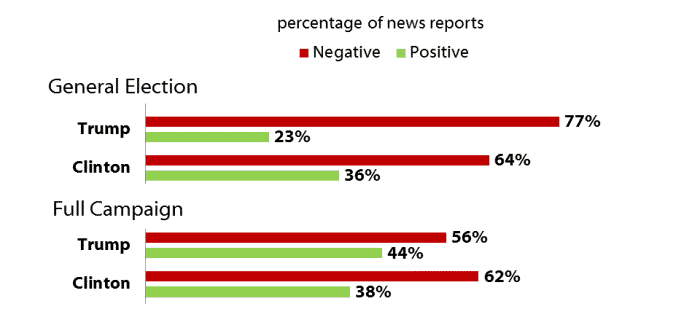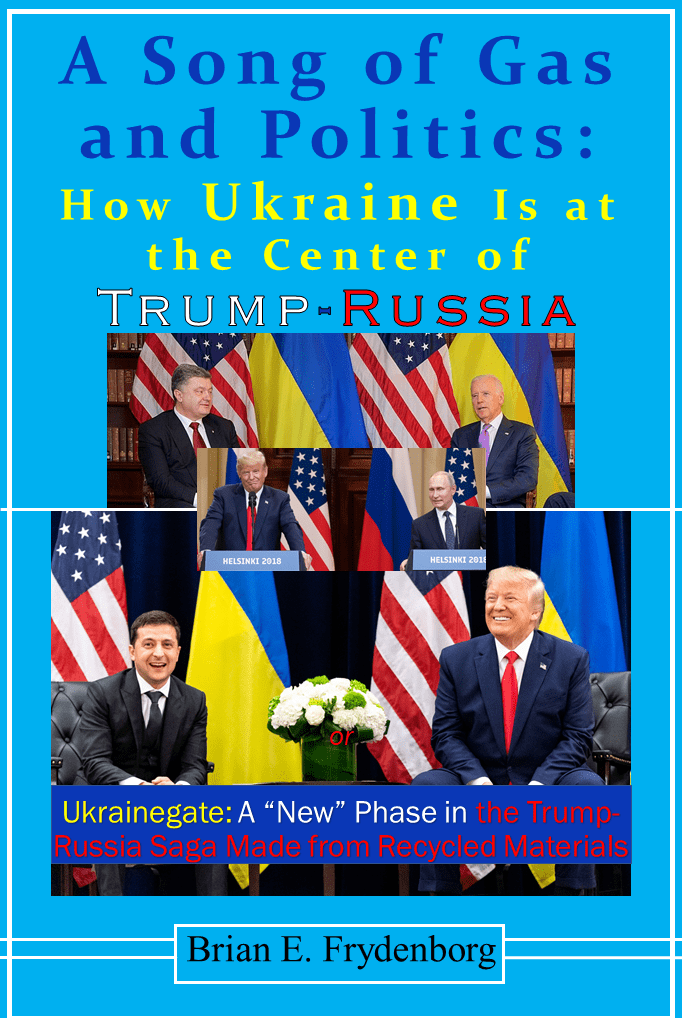The dangerous myopia of the media must be corrected or opponents of Trump—including the free press—have little chance to topple him in 2020
By Brian E. Frydenborg (LinkedIn, Facebook, Twitter @bfry1981) November 19, 2019; see Brian’s related brand-new e-Book, from which this below piece was adapted and greatly expanded: A Song of Gas and Politics: How Ukraine Is at the Center of Trump-Russia: or, Ukrainegate: A “New” Phase in the Trump-Russia Saga Made from Recycled Materials, available for Amazon Kindle and Barnes & Noble Nook

WSJ
WASHINGTON, WESTON, & CAMBRIDGE — These are dark times for America and its journalists, not least because a lack of self-awareness all but guarantees that we are not learning from history and are, therefore, doomed to repeat it in a way that threatens the viability of the fourth estate and the American republic itself. A good starting point to begin this exploration is by demolishing that which should not even discussed by respectable outlets and noting aspects of how such outlets are being manipulated by nefarious forces. Secondly, a brief examination of some of the challenges facing the media will follow along with why it is crucial that these challenges be addressed. Finally, looking at some of the main problems from 2016 and how the media is already repeating its mistakes from then should raise awareness of the dire situation into which the media and the country are falling as we approach the 2020 elections.
Trump and Putin, Playing the Media Like a Fiddle
Apart from the media not even attempting to convey the larger picture (with only a tiny number of exceptions among major/respectable/established outlets), another gross media misfire is the “coverage” of how Joe Biden’s son is “involved” in this new phase of the Trump-Russia überascandal… except there is no evidence he is involved, none at all, as any of multiple respectable fact-checks will show (no need to repeat their fine work here); his “involvement” rests on two paper mâché pillars: Republican bonfires of lies and the media pouring gasoline onto these fires.
To be clear, this is classic Kremlin-style disinformation, especially the propagandistic, perhaps libelous lie that Hunter Biden, son of Joe Biden, warrants some sort of criminal probe because of wholly unsubstantiated allegations of “corruption.” Firstly, Hunter Biden is no Eric Trump; while he has had some problems and his life has not been as soaring as that of Beau Biden—the close brother of Hunter and beloved son of Joe stolen before his time by cancer in 2015—Hunter did manage to pay his own way through Georgetown—even working odd jobs to manage that—and would eventually graduate from Yale Law School. Hunter’s perch on the board of Burisma—a Ukrainian gas/energy company—reeks of the standard favoritism shown scions of elites, a banal favoritism devoured almost accidentally like a minnow by the speeding great white shark that is the over-the-top corruption of the mafia-like Trump family, whose members give the impression that they deliberately broadcast their misdeeds, as if to do so is a boast along the lines of a lion roaring that wants everyone to know it can get away with breaking the rules.
Currently, the media receives a lot of unfair criticism from both the right (pretty much everything Trump and the GOP say these days) and the left (say, pretty much anything Bernie Sanders and his supporters say these days), and while the press has also conveyed this criminal and entitled mentality of the Trumps, it has been alongside normalizing coverage that blunts the ability of the audience to appreciate the utter simplicity of what this is. Blatantly false propagandistic lies are often challenged by anchors who appropriately express exasperation, and more educated, elite viewers and readers may enjoy seeing a sharper anchor take down a serial liar, may see the hollowness of a poor argument on a page, but many others will simply hear another competing argument, their minds more susceptible to sexy talking points tailored to trigger preconceived notions. Despite any pushbacks on TV or competing op-eds, the lies are allowed to repeatedly be aired and printed at length and in detail by respectable (sometimes even the most respectable) news outlets so that, if someone was not paying close attention, it sounds like there’s as much a concern (or at least somewhat comparable concern) about Joe and Hunter Biden’s “corruption” in Ukraine as there is Trump’s undeniably real corruption (just ask several of his own current and ex-top officials and appointees).
This is exactly what the Kremlin does: the White Helmets group of Syrian civilians trying to save other civilians in the aftermath of Russian and Syrian airstrikes? They’re terrorists, says Russia. The Ukrainians trying to fight Russian and separatist aggression? They’re Nazis, according to the Kremlin. Even educated, elite news consumers fall for this nonsense: in the first case, the Russian lies play into the preconceived notion of some that pretty much all Syrian Muslims are bad and associated with terrorists, therefore Russia’s policy of backing Assad is justified as there are not distinctions between Syrian rebel groups, that Russia’s policy is the only way to keep the West safe from terror. In the second, the U.S. has a history of backing right-wing fascistic regimes during the Cold War, from the Congo and Latin America to Vietnam and South Korea, so hey, looks like the same thing is happening in Ukraine to even educated people with a preconceived notion that any U.S. foreign intervention must be wrong and must support the “bad guys” (your Chomsky and Greenwald/Scahill Intercept crowds). The truth itself does not matter, but the repetition of the lies does. Even worse, the media follows whatever subject Trump wants them to like a pavlovian dog, doing his bidding by talking about whatever he wants them to talk about and when, asking the questions he wants asked, muddying the waters even further. This is how the media often unwittingly plays into his hands (yes, even when it talks about the size of his hands).
Lies are repeated ad nauseum and networks and column space even in the top and best outlets are still taken up with the lies, such that “lies” and “non-lies” become two sides of roughly equal weight. And once there are videos and articles perpetuating the lies, they can be shared and edited with virtually no filter on social media (even now, Facebook, Twitter, and Google are refusing to take down Trump campaign ads that are lies about the Bidens; Biden has the same luck when complaining to the New York Times about its publication of similar right-wing lies). An alternate reality is constructed of lies simply by perpetuation and repetition. The gods of false equivalence have seen the sacrifices offered and are pleased, rewarding those who pray to them.
What is happening now and has been happening for some time is at the level of having a “debate” about gravity existing (or, say, climate change), with most Republicans on television or writing columns in the media predictably, forcefully, and consistently repeating the lies in over-the-top Orwellian style, recalling the chilling passage from Orwell’s own 1984: “…if all others accepted the lie which the Party imposed—if all records told the same tale—then the lie passed into history and became truth. ‘Who controls the past’ ran the Party slogan, ‘controls the future: who controls the present controls the past.’”
There is something very Russian mafiaesque, very Putinesque, and very Soviet about this last point, and as we endure Trump and his family making a mockery of norms, laws, and the Constitution itself, the media still often keeps trying to cover Trump and his office as he has occupied as if it he and it can still be described in the normal language of politics (I got cut off at an Atlantic Council event when I pushed back both at Dr. Michael Pillsbury—a conservative China expert and an enthusiast of Trump’s China “policy” and who has recently inserted himself into the Hunter Biden “controversy”—for even thinking the Administration had something that could be labeled a China “policy” and at the moderator for trying to frame the conversation as if it was possible to discuss this “policy” like any other policy, this administration like any other administration [video here, excuse my appearance as I was out when I found out about the event and, to be fair to them, I did take a bit long to get to my point/question]). Adam Schiff received much criticism for reducing Trump’s phone call to a scene from a mafia movie, but his dramatized description was for more accurate than the attempts to couch the interaction to any degree within the lexicons of diplomacy, governance, administration: this was a corrupt man engaged in criminal activity, winking and nodding and dangling the power and prestige of his office, the resources of the United States of America, as bargaining chips in a sordid, selfish attempt to damage his chief political rival and that had absolutely nothing to do with any policy or American interests. Just as Putin and Soviet apparatchiks put out insane talking points and conspiracy theories, so too do Trump and his minions, and the media keeps covering them in a way that gives them oxygen and legitimacy, keeps having the same propagandists on who spew them at length.
Challenges for American Journalists that Must Be Overcome
Given their aims, why would they not keep it up? After all, barely over one-third of American adults over twenty-five years of age have a four-year college degree, and many of those two-thirds and even some of the third are struggling just to get by and hardly have time to immerse themselves in the details of Trump-Russia news (especially as its reported so piecemeal, without showing the larger picture). Even expecting educated, engaged people to understand the true nature of this saga when the typical reporting fashion is to throw pieces of a puzzle at people without providing the context of how those pieces fit in with each other and larger relevant history is difficult enough, but expecting most of America’s people—including many millions of low-educated, low-information voters—to understand this story presented as it has been and still is by the media is simply a fantasy.
Expecting readers to peruse dozens of 800-word reports and opinion pieces honing in on one aspect or several aspects of a massive picture—trying, as I have made the comparison before, to explain just a figure or a corner of the Sistine Chapel ceiling—might not be the best way to try to inform the public, at least if we are still to believe that there is something of a journalistic mission to inform the public as a whole and not just niche, paying slivers of the population. Of course these micro-stories are vital, and without them, it would be impossible to piece together the larger puzzle because we’d have no pieces. But is not analysis of all the component parts and how they fit together just as important? As I have explained in the past, the CIA and the U.S. intelligence community seems to think so, and that is why desk analysts and in-the-field source intelligence collectors are the two main sides of the same intelligence coin: each needs the other to be relevant to policymakers.
Those in the news business who appreciate big-picture deep-dives sure would not knock puzzle pieces, but from my own experience—and from the sheer lack of deep-dive big-picture explainers in major publications and on television—it seems there is a serious degree of reluctance and even hostility to giving green-lights to the long, contextual explainers among media gatekeepers. This strikes me as pretty irrational. “It’s too complicated” is often what I have been told by representatives of mainstream outlets, and yet is that not the worst possible rationale to not publish for a news organization? But this falls flat on a practical level, too. Would not an overworked, time-pressed single-parent prefer reading a single longform article in several sittings if it explains the bigger puzzle picture and how pieces fit together over reading a much larger number of more disjointed articles that fail to point out important connections? A point I often hear is that it is a challenge that may be too much to ask a reader to read a long article; abstractly, this point has some merit, but when compared with the challenge of making sense of story after story coming at you at the speed of Trump tweets, it sure seems more manageable than that alternative. Thus, by not having enough faith in readers to even try to tell them the bigger picture, the media helps to dumb them down and keep them even less informed.
The dots are out there, and have been for years, begging to be connected and properly interpreted with the necessary context. I get it, it’s hard, and in my almost thirty-eight years of life, I’ve never seen so many major stories come at us so fast, so furious. And yes, it’s tough to keep up with it all, even for writers like myself. But if the top-tier news outlets cannot transcend these difficult challenges, cannot show self-awareness, and cannot admit to and grow from their mistakes, there really is no hope. It’s a high bar on incredibly complex stories, but that’s the media’s job: to get the tough stories right, to go into the necessary depth, to provide the necessary context, to assign a sense of weight and proportion. If the media does not succeed here, America will fail and historians will be right point to the media as deserving much of the blame.
And yet, if past is prologue—and if a willingness to learn from the past is the first chapter—we do not have much reason to be optimistic…
The Media Let Itself Be Owned by Trump and Putin in 2016 and It Is on Track to Do the Same in 2020
If Trump has been and is good at anything consistently from being a candidate through his entire presidency thus far, it is manipulating the media for his personal and political ends. My August, 2015, warning that he was a master media manipulator (and likely to win the nomination) proved all too prescient, and in some ways we are now seeing a repeat of the 2016 election cycle, including terrible news coverage (Ukraine and Burisma are replacing Benghazi and e-mails) and what should soon be known as the Second Russo-American Cyberwar, with indications that this will just continue to be the case.
But to truly appreciate the horror of what is happening now, we should take a serious look at what really went down in 2016…


Berkman Klein Center for Internet and Society at Harvard University

Shorenstein Center on Media, Politics and Public Policy at Harvard Kennedy School
The above charts are quite clear: it was Trump’s chosen issues and his lines of attack that dominated coverage in in 2016, not Clinton’s; both in terms of issues and scandals, then, the media played alarmingly into Trump’s hands. In explaining why the public focused so much on particular issues relative to others in a way that greatly disadvantaged Clinton, Harvard’s Berkman Klein Center noted within its extensive report—Partisanship, Propaganda, and Disinformation: Online Media and the 2016 U.S. Presidential Election—that “[t]he electorate appears to have been paying attention to the media (pg. 89). Further backing up my own conclusions, the report noted that “[a] major critique of the media’s coverage was that it erred on the side of offering critical coverage of both candidates and ultimately misled the public by creating a sense of equivalence in the weaknesses and fitness for office of the two candidates” (pg. 69).
The Shorenstein Center, also at Harvard and also corroborating our sentiments, made it clear in its concluding report on 2016 election coverage that is was journalists who failed:
Were the allegations surrounding Clinton of the same order of magnitude as those surrounding Trump? It’s a question that journalists made no serious effort to answer during the 2016 campaign. They reported all the ugly stuff they could find, and left it to the voters to decide what to make of it. Large numbers of voters concluded that the candidates’ indiscretions were equally disqualifying…
False equivalencies abound in today’s reporting. When journalists can’t, or won’t, distinguish between allegations directed at the Trump Foundation and those directed at the Clinton Foundation, there’s something seriously amiss. And false equivalencies are developing on a grand scale as a result of relentlessly negative news. If everything and everyone is portrayed negatively, there’s a leveling effect that opens the door to charlatans. The press historically has helped citizens recognize the difference between the earnest politician and the pretender. Today’s news coverage blurs the distinction.
The Berkman Klein report lays out how the professional media was duped by conservative extremists, noting that the right-wing activist group
Judicial Watch and the Trump campaign were doing what media activists have been doing forever: staging events that would motivate professional media as a way of setting the agenda. What we see here is a successful operation to put red meat too juicy to pass up in front of traditional media. The fact that the traditional professional media were the targets of intentional manipulation does not absolve them of responsibility for checking the materials put in front of them, much less of supporting a Trump campaign narrative. (118)
The report also did not shy away from noting the similarity of Republican and Trump operational techniques and those of the Russian government:
One technique we saw in the context of immigration was “flooding the zone”…This general approach of generating a large number of stories to create a wave of attention has been documented elsewhere, in the context of Russian propaganda techniques… [such flooding in part ends up] limiting the capacity of traditional journalism to fill its role as a neutral arbiter of the validity of fact-related claims, and inoculating the core target populations against corrective investigation and criticism. (128-129)
The conclusion of the report noted that Trump and his allies had shown the world “a master class in setting the public agenda” (130). Even so, the report earlier noted that the false smear campaigns depended on the mainstream press allowing itself to be manipulated: “…it is central to the success of a propaganda and disinformation campaign to set the agenda for the mainstream press and then rely on that press coverage as an external source of validation and accreditation… (128). It further reinforces this in the conclusion and places an important part of the responsibility for this failure on the journalistic and editorial classes:
…the fundamental shift occurred only after the mainstream press picked up the story, legitimated it, and turned it from a proposed central item for the public agenda into the actual agenda item that became the one most widely discussed in August 2016. The only countermeasure to this first dynamic [of setting the public agenda] that is consistent with the First Amendment is a highly vigilant professional press. Recognizing that the press is being hacked and that certain storylines are the opposition researcher’s equivalent of clickbait for journalists is an absolute necessity for editors, even more than for line journalists. Receiving an “exclusive” from Peter Schweitzer and writing a story that paints Clinton in a negative light is the easy path for a journalist and an editor. Tracking down the funding and sponsorship of Schweitzer’s research, and developing an investigative story about who is behind this assault and why it is being launched, is harder. It is, nonetheless, the fundamental professional responsibility of the press if it is to retain its unique role. The second dynamic explored in this case study is propaganda and, in particular, disinformation. A sustained campaign of materially misleading political messaging was intended to shape its target population’s attitudes and beliefs and to keep that group from engaging in critical reflection on the policy and political choices they faced. It leveraged basic psychological features of memory and belief formation—that repetition and familiarity improve recall and credibility—and basic features of a network of interlinked sites to create the appearance of facts reported in many diverse outlets… (130-131)
Conclusion: Time Is Running Out and Things Do Not Look Good

Mladen Antonov/AFP/Getty Images
It is not even 2020, and already false the equivalence of the Bidens and Trumps is getting plenty of “repetition and familiarity.” Remember that Trump wants to run against Elizabeth Warren and timed this Biden “fake news” to gain traction in the weeks running up to the final debates before Iowa to damage him while he is entering that critical contest; remember that Warren has no serious record of accomplishing what she is talking about (unlike Biden with his long, accomplished career) and her leftist policy positions and ideology are far out of the mainstream, making her appeal to voters in key swing states like Pennsylvania, Ohio, Florida, North Carolina, and Michigan, (Wisconsin, too, in most polls) is significantly lower than Biden’s, making her by far the preferred opponent in the eyes of Team Trump compared to Biden and objectively less electable; even in her own state of Massachusetts in 2018, Republican governor Charlie Baker got almost 6.5% more of a share of the votes than she did: that’s right, in her liberal home state, she’s less popular than the Republican governor. She sure had momentum before the Ukraine stuff became an issue, but she is much closer to him now in what is currently mainly a two-person race and is beginning to show signs she might be able to contend his front-runner status a few months before the Iowa caucuses, the first of the Democratic Party’s 2020 nominating contests. Still, Biden is clearly leading in most national polls, in most large states, in most key states after Iowa and New Hampshire, and in most general-election swing states; he has the broadest, most geographically and ethnically diverse-and-deep coalition of any candidate. Yet we have seen the damage that fake news disinformation propaganda can do to a candidate, and Trump and the GOP are focusing their smear campaign on Biden for the simple reason that they see him as a genuine threat in ways they do not see Warren or other presidential hopefuls.
And here we are, nearly a whole year to go, with the mainstream media already giving (and having given) ample oxygen to blatantly false conspiracy theories about Biden and his son to the degree that such theories are sure to dog him all throughout his presidential campaign. In other words, things are all playing out (again) according to Trump’s and Putin’s plans, in large part thanks to the media, which is allowing itself to be weaponized by extremists and a hostile foreign government to commit election interference for the second presidential election cycle in a row.
See Brian’s related brand-new e-Book, A Song of Gas and Politics: How Ukraine Is at the Center of Trump-Russia: or, Ukrainegate: A “New” Phase in the Trump-Russia Saga Made from Recycled Materials, available for Amazon Kindle and Barnes & Noble Nook; preview here
In the interest of full disclosure, the author interned for then-Senator Joe Biden for the last quarter of 2006.
© 2019 Brian E. Frydenborg all rights reserved, permission required for republication, attributed quotations welcome
Brian E. Frydenborg is an American freelance writer, academic, and consultant from the New York City area. You can follow and contact him on Twitter: @bfry1981
If you appreciate Brian’s unique content, you can support him and his work by donating here
Feel free to share and repost this article on LinkedIn, Facebook, and Twitter. If you think your site or another would be a good place for this or would like to have Brian generate content for you, your site, or your organization, please do not hesitate to reach out to him!
